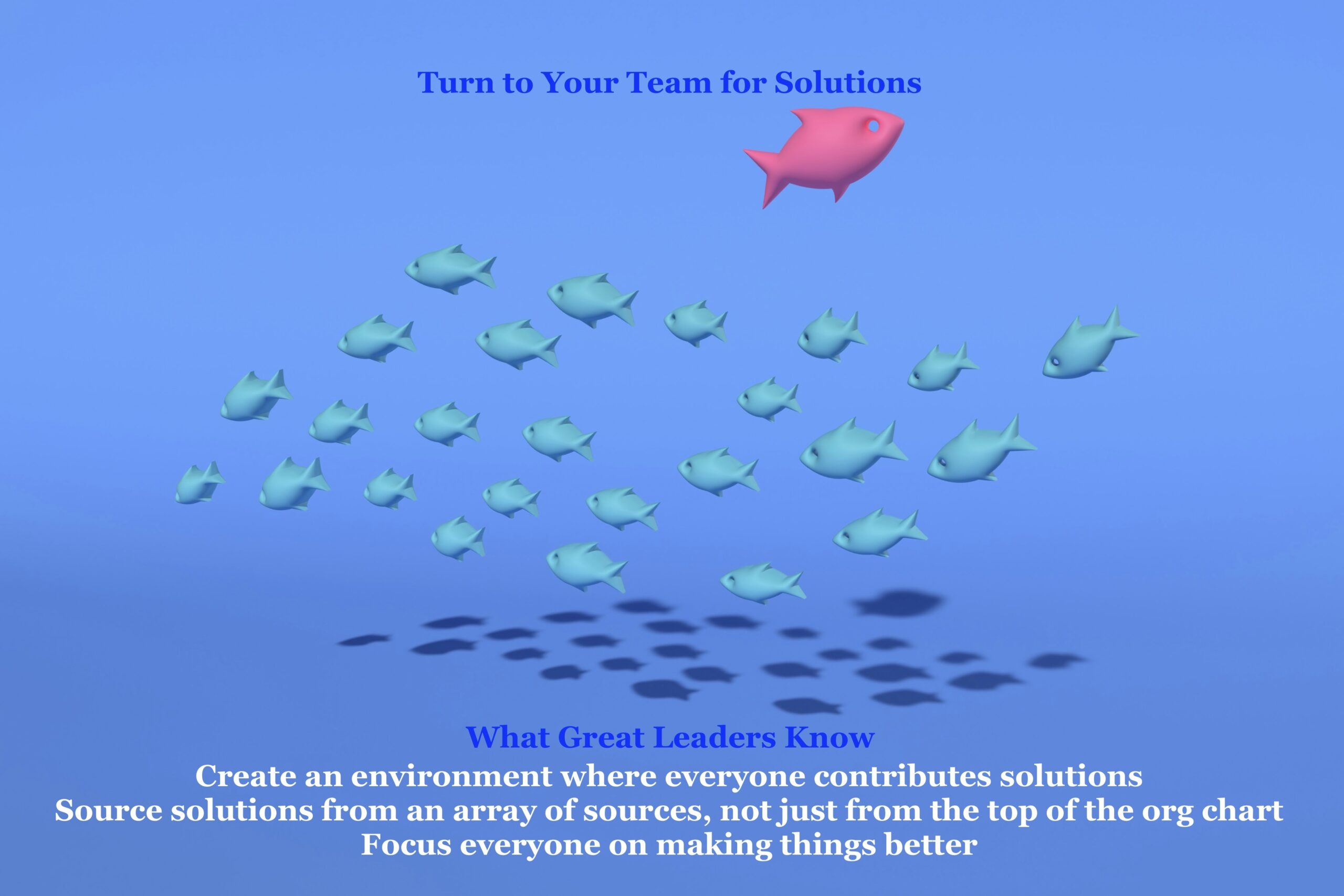Your cart is currently empty!
Tag: Business

Turn to Your Team for Solutions
Many minds are better than one. Turn to Your Team for Solutions.
Have you ever worked at a job where every decision had to be made by the boss rather than turning to the team for solutions? Asking your team for solutions is a model for growth while single approval control is a misstep. Following the traditional model of business means yielding to the more senior leader as the expert in all circumstances. To be fair, nobody can be an expert at everything or should be expected to be.
Great Leaders know solutions, ideas, innovations come from an array of sources and their role is not to be the one and only solution provider, but the person who creates an environment where everyone has value and is depended upon to contribute to solving problems, innovation, growth.
The obstacle to including team members in decision making is the leader’s need to control. It may seem like the right thing to do is to defer to the boss, but this presents individuals from learning how to make decisions and grow.
When I learned to give problems back to my team, they generated amazing solutions.
Since they were hitting the roadblock day after day, they had a perspective I did not. I made it my goal to engage the team in problem solving. When they would ask me what to do, I asked them what they thought. If they provided a workable solution, I would let them introduce it and give them credit- “We’re going to follow Amy’s plan today.” As you can imagine, Amy’s stock rose among her peers and everyone on the team was motivated to provide the next solution. When other teams spent time gossiping and tuning out, mine were thinking about how can we make things better. Not everyone can offer a workable solution, but that’s not important, engaging them is important.
I remember asking my front line team how we can reduce supply costs. They knew exactly what needed to happen and we reduced supply costs by 20%. They were excited to watch our progress! I was too!
By turning to your team for solutions, employee engagement, retention rates and operational performance results will all improve, leaving the controllers in your wake.
What Great Leaders Know
Create an environment where everyone contributes solutions
Source solutions from an array of sources, not just from the top of the org chart
Focus everyone on making things better
Links
https://whatgreatleadersknow.com/
https://hbr.org/2023/03/how-to-equip-your-team-to-problem-solve-without-you

Mastering the Art of Hiring: Great Leaders Know Whom To Hire
Mastering the art of hiring is essential for any great leader to ensure long-term success. Indeed, mastering the process can make all the difference.
Everyone is looking for the right team members, but few actually hire them and fewer still retain them, yet the most important decision Great Leaders make is hiring the right person. But how to do it? Mastering the art of hiring requires dedication and strategy.
Hire for mission alignment and natural ability then teach skills. Remember, mastering the art of hiring involves focusing on the right attributes.
Focus Interviews on understanding the candidate’s personal mission- why the candidate did what they did matters even more than what they did, but most interviews focus on what. Understanding the why helps determine mission alignment between the candidate and the organization. Employers want to hire people who have the same mission as their organization. Employees want to work for organizations that align with their personal mission. Great Leaders Know Whom To Hire, and aligning missions is the initial step.
Great Leaders Know there is no substitute for talent.
Hiring is the most important opportunity any leader has. Retention is the second. Yet, many sourcing, hiring, onboarding, and development processes do not receive sufficient focus or resources. Great Leaders Know Whom To Hire and how crucial it is to retain those hires. By mastering the art of hiring, they secure their organization’s future.
Personality traits like imagination, organization, and math skills are with us since birth, although they can be developed or stunted based on our life experiences. Many skills, like following a set instructions or processes, can be taught.
Great Leaders highly value experience because it demonstrates a continued pattern of success and the ability to learn. It demonstrates what someone has done and what they might be able to do. However, experience is not a substitute for ability, and great leaders know they must balance both when hiring.
Every organization is a tapestry of the aligned and mis-aligned, an array of natural abilities, a wealth of experience, and fresh eyes, and a spectrum of learning styles. Great Leaders orchestrate the performance of individuals and the team, knowing whom to hire to maintain a harmonious balance. Mastering the art of hiring ensures this balance is optimal.
Great Leaders Know
Hire for mission alignment and natural ability then teach skills
There is no substitution for talent
Hiring is the most important opportunity any leader has
Links
https://www.yardstick.team/interview-questions/mission-orientation

Mastering Leadership: Letting go without losing control
What Great Leaders Know- Southern Fried Rock and Micromanaging
I love music. One of my favorite lyrics appears in the song Hold On Loosely written by James Peterik, Jeff Carllisi, and Richard Donald Barnes for the band 38 Special. There is an unexpected leadership message in, of all places, Southern Fried Rock music. When learning to lead without micromanaging, we can take inspiration from different sources. Letting go without losing control, a lesson from an unexpected source.
“Just hold on loosely but don’t let go”
So much meaning from 8 words. For me, they describe being in a healthy relationship. A healthy relationship is crucial in leadership and avoids the pitfalls of micromanaging. By learning to lead without micromanaging, leaders build solid and trustworthy relationships. Letting go without losing control becomes essential.
Trust, commitment, communication, and boundaries
Great Leaders know healthy relationships are based on trust, commitment, communication, and boundaries. Strong relationships are formed in the forge, which is to say, time has been spent strengthening them through the trial. Great Leaders remain committed to their team members who understand they won’t let go at the first sign of trouble or even the second. Mastering the art of letting go without losing control is key.
Micromanaging is toxic
Great Leaders know micromanaging is neither a healthy nor a pleasant experience. Many managers rely on micromanaging regularly. Faced with a challenge, they return to their default setting, if you want something done right… but this will not work and drives a wedge into the relationship. Micromanaging or over-managing is neither sustainable nor beneficial for the giver or the receiver. Learning to lead without micromanaging is essential to building trust, a two-way street that strengthens the relationship. Great Leaders hold fast but allow for movement. Impeccable communications permit comfort. Thanks to Southern Fried Rock, leaders can learn to manage better. So, remember the importance of letting go without losing control.
What Great Leaders Know
Life lessons can come from unexpected places. Take Southern Fried Rock, for example, which offers insights into leadership and avoiding micromanaging. Thinking about letting go without losing control can provide deeper interpretations.
Strong relationships are formed in the forge, as discussed in both leadership and Southern Fried Rock music. This also applies to the principle of letting go without losing control.
Remain committed to your team members at all times; This shows great leadership and avoids micromanaging.
Micromanaging is destructive for the giver and receiver where trust, is crucial. Learning to lead without micromanaging encourages a healthier work environment and embodies the essence of letting go without losing control.
Links

Leadership requires Followership
People need a reason to willingly follow you consistently.
“If they ain’t followin’… you ain’t leadin’.”
Griff Thomas
Leadership depends upon followership and followership depends upon leadership. Having a title does not make you a leader. The only thing that makes you a leader is people choosing to follow you.
What Great Leaders Know
- Lead from the front and show the way
- Results of the team measure leadership effectiveness
- We win when everyone crosses the finish line
- Leadership is a team sport
Links